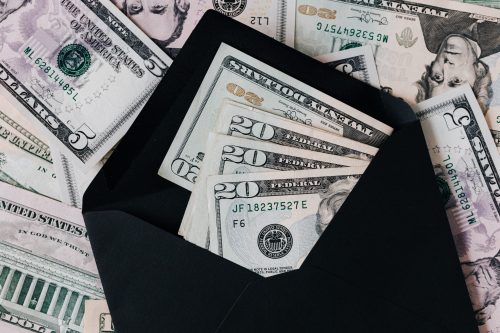

Unit 22 :
Discussing Taxes (Part 2)
![]() Advanced
Advanced
Vocabulary
Repeat these sentences with your teacher first.
1. to hit pause (phr)
to stop an activity for a short time
2. at play (phr)
influencing a situation
3. to take a hit(phr)
to suffer damage, loss, or costs
4. green tax (phr)
a tax on activities that are harmful to the environment, intended to encourage activities that are better for the environment
5. to qualify for relief (phr)
to have the right qualities or be in the situation that allows you to enjoy a specific tax benefit
6. to bump up(phr)
to increase slightly
7. Corporate Social Responsibility (CSR)(phr)
the activities of a company that help or benefit its employees, the community, or society
8. to come in(phr)
to total, in number
9. to keep something down(phr)
to work to stop something from increasing or being too high
10. red flags(phr)
a sign of danger or warning
Dialogue
Read the dialogue aloud with your teacher.

Cristy

Ivana

[Fade in] Okay, so let’s just hit pause for a second. Cristy, I’m thinking it would be good to go over some of the key factors at play here… so we’re all clear. Make sense?

Definitely. So, one of the big things to note is the hit we took on capital gains.

From the sale of that property in Jersey?

Precisely. That bumped up our taxable income considerably. And then… there’s the new tax they’re imposing on our GHG production. Not huge, but still significant.

The relief is the lower corporate tax rate. Simple as that. Some other tax incentives on renewables and such, but I don’t think we qualify there, do we Cristy?

No, we don’t. We did get a bit of relief on machinery. All the new stuff we bought from Mexico.

The new Fed rules mean we are able to fully expense those purchases in year one.

Yes, that was part of the whole rationale behind the purchases in the first place. And… wasn’t there another big tax exemption somewhere?

I don’t know about big. But I suppose our most significant one came through our CSR activities. Our charitable donations came in around 50k. So we are exempt from tax on that.

That’s a bonus. And could we have avoided more tax on that front? Or are we already maxed out?

Not nearly. We can claim a deduction for up to 25% of our net income.

Oh wow. Didn’t realize that. I still think 200k sounds like a lot, though.

Well… I should mention too that we brought in someone from DPS to review all this. So I’m pretty sure we’ve done all we can to keep the final bill down.

Great. I know you’ve put a ton of effort into this. But… I just had one more thing before we wrap up…

I wanted to have a quick look at cost of goods sold, because there were some red flags there when we bought the company. Could we just take a few minutes to go over what that looked like?
Article
Read the article with your teacher.
Examples of the taxes you may actually pay in your daily life

1. Federal income tax
Income tax is a tax on your income, wages and earnings. The federal government uses a progressive tax with seven marginal tax rates. It collects income tax over the course of the year. For most people, income tax comes out of your paycheck.
2. FICA and other payroll taxes
These are taxes that employers remove from your paycheck and send to the appropriate government agency. If you’re a freelancer or self-employed, you will need to pay these on a quarterly basis via estimated taxes.
3. Self-employment taxes
If you’re self-employed, you have to pay the same income and payroll taxes that others pay. But instead of paying the FICA tax, you have to pay self-employment tax. That’s a tax equal to 15.3% of your income – 12.4% for Social Security and 2.9% for Medicare.
4. Capital gains taxes
When you sell assets, you may have to pay capital gain tax on your net gains. Common assets include investments and real estate. You also have to pay tax when you sell collectible or valuable items, such as jewelry or a collection of rare stamps.
5. Estate taxes
This applies to the money and assets that you pass on after your death. This includes cash, investments, real estate and other valuables. The federal government collects an estate tax, as do 12 states and the District of Columbia.
Source: https://www.policygenius.com
Discussion:
Answer the following questions to your teacher.
1. Of the taxes listed above, what are the ones that you are paying?
2. Can you describe each taxes in your own words.
Let’s practice
Collocations: Match the collocations in the box and then use them to complete the sentences below. (If necessary change the tense of verbs to fit the context, i.e., to past or future tense.)
A
1. Tax
2. Capital
3. Charitable
4. To claim
5. To fully
6. To qualify for
7. Green
8. Cost of
B
A deduction
Donations
Expense
Goods sold
Gains
Incentives
Relief
Tax
C
1. We need to include all direct production expenses in the__________for our furniture products.
2. Do you think we should______________ __________________our equipment purchase this year, or stretch it out?
3. Detroit is offering some pretty good____________ _____________to convince companies to relocate there.
4. If you’re _____________ _____________for this expense, you’d
better have the invoice to back it up.
5. It’s been a tough year, and I really hope we __________some kind of
________________ to ease our tax burden.
6. The government says its committed to the environment, but the new
_________________ _____________________doesn’t really do much.
7. The sale of all those bonds will increase our ________________ ____________________for the year significantly.
8. Handing out some large_________________ ____________________ has really helped our reputation in the community.




